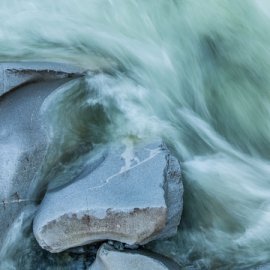A New Strategy for Nature, Part Two
-
English
-
ListenPause
Welcome to World Ocean Radio… I’m Peter Neill, director of the World Ocean Observatory. How, in the face of the all-out attack by the Trump administration on environmental regulations and values, do we create a new strategy for Nature? Here are four steps to consider: First, we must propose a new coherent idea around which to define environmentalism and to infuse it with a broader awareness of Nature as the central, organizing system that unites us all through many different and complex connections. From such a conceptual idea must come a transformed understanding of the natural, financial, political, social, and re-creational value of Nature as focus for living in the 21st century. Only from this holistic cohesion can we mobilize and expand audience and political will to the scale required to resist the power of vested interest and fear of change. Climate change is already affecting our lives in myriad ways and we must move beyond even adaptation and mitigation to implement a more effective strategy, respectful of our basic laws and rights, to assure survival. In The Once and Future Ocean, (Leete’s Island Books, 2016), I argued for a new paradigm centered on the most valuable natural system on earth -- the ocean/water continuum, the global water cycle, that distributes the one element we all need worldwide to live. The old paradigm, based on consumption driven by fossil fuels, has out-lived its utility, its positive benefits are now overwhelmed by its negative consequences, and its practitioners are dinosaurs, sinking slowly into the mud of retrograde thinking, failed enterprise, structural oblivion, and bankrupt values. To revive these is impossible, to persevere is regressive, and to assert their continuity is destructive. The new paradigm calls for a “hydraulic society,” a new system of value, organizational structure, and social behavior based on the movement and purity of water in all its forms and places. We are each made of water; we die without adequate water; we use water to support the best of what we create; we conserve, recycle, and apply water to what we need first and foremost to protect and augment our subsistence; we revere water in all its sacred manifestations that have been recognized and celebrated by all cultures for all time. If we need one big idea to motivate and nurture us, I submit this one is modern, vital, practical, essential. Second, we must reframe public understanding of environmental value by targeting broad public reaction against the new onslaught, by capturing the general outrage over the cross-the-board contravention of protections and focusing it toward political action. The withdrawal of all clean water controls and standards can be understood hypothetically or specifically as the restrictions are lifted and outcomes become known and expressed as unsafe drinking water or polluted beaches. Third, we need theory and practice to finance this change. Some economists speak now of the green economy and the blue economy, perpetuating the historical separation of policy and practice between land and sea. We had better think in terms of “ecosystem services,” the incorporation of the true measurable value of Nature into our calculations of price, productivity, and profit. We need to re-organize our governance structures, planning and manufacturing standards, laws and regulations intended not to inhibit growth or profit but to counter abuse. We need to re-price all things and processes in terms of actual water use, providing first a standard supply to every individual as a basic human right, and thereafter controlling, conserving, and pricing all other uses on a scale of need versus sustainability, recalculated to assure that every good and every service protects the finite global supply through conservation, equity, justice, and peace at home and abroad for ensuing generations. Finally, we must communicate relentlessly, through word and action, to transcend the inhibiting boundaries of history. We must embrace new methods and systems that prevent profligate water waste and we must resolve to prevent water disruption, water theft, and water conflict from today forward. We must accept that we are all water refugees, helpless without pure and adequate supply, and lost without Nature as source, now and forevermore. - - - WORLD OCEAN RADIO IS A PROJECT OF THE WORLD OCEAN OBSERVATORY, IN ASSOCIATION WITH WERU-FM, BLUE HILL, MAINE. WORLD OCEAN RADIO IS DISTRIBUTED BY THE PUBLIC RADIO EXCHANGE AND THE PACIFICA NETWORK. FIND OUR PODCAST ON ITUNES AND AT WORLD OCEAN OBSERVATORY DOT ORG.
In the face of an all-out attack by the Trump administration on environmental regulations and values, how do we create a new strategy for Nature? In this episode of World Ocean Radio, host Peter Neill posits this question and lays out a new organizing strategy for our natural systems, including and foremost our relationship with the global water cycle.
About World Ocean Radio
Peter Neill, Director of the World Ocean Observatory and host of World Ocean Radio, provides coverage of a broad spectrum of ocean issues from science and education to advocacy and exemplary projects. World Ocean Radio, a project of the World Ocean Observatory, is a weekly series of five-minute audio essays available for syndicated use at no cost by college and community radio stations worldwide. A selection of episodes is now available in Portuguese, Spanish, French, Swahili, and Mandarin, enabling us to reach 75% of the world's population. For more information, visit WorldOceanObservatory.org/world-ocean-radio-global.
Image
Andrew Bertram
- Login to post comments



